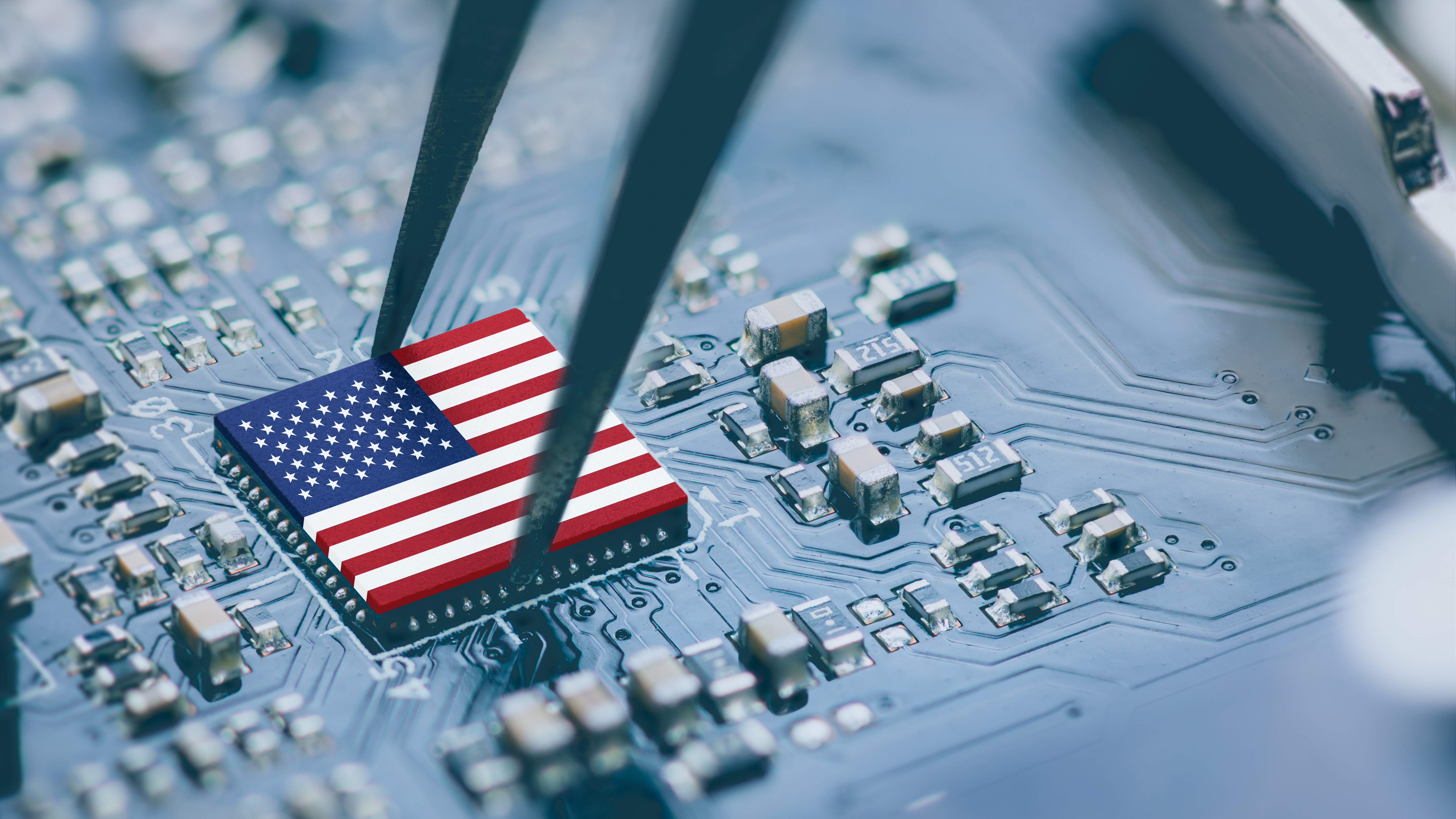Trump purge hits Chips Act office, two-fifths of staff to be terminated: Report
The gov't staff behind $52 billion chip program join the list of DOGE casualties

Two-fifths of the staff of the U.S. Chips Program Office, responsible for managing the Chips and Science Act, have been laid off by the Trump administration. 60 total employees will be cut by the end of today.
According to Bloomberg, 20 employees previously accepted resignations last week, with the other 40 being "probationary" employees who had begun their positions within the last two years; those probationary workers were to be terminated by the end of Monday.
It is no secret that President Trump is not a fan of the Chips Act. The law signed by the previous President Biden devotes $52 billion to investing in American semiconductor production and R&D. In response, companies including Intel and TSMC have pledged $400 billion in private investment in moving more of the supply chain to the U.S.
“The CHIPS Program Office has told us that certain conditions that do not align with President Trump’s executive orders and policies are now under review for all CHIPS Direct Funding Agreements,” shared GlobalWafers spokesperson Leah Peng. Some funding promised by the Biden-era Chips Office includes stipulations requiring allowing the unionization of chip fab workers and paid parental leave, policies outside of the Trump administration's wishes.
Rather than rely on promising grants to companies, Trump seems to prefer leveling economic tariffs to push companies into moving into the U.S. Commerce Secretary Howard Lutnick claims this strategy is what secured today's announcement of TSMC's $100 billion new investment in the United States, which includes a pledge of three new U.S. fabs.
“America gave TSMC 10% of the money to build here,” Lutnick said at today's White House press conference. “And now you’re seeing the power of Donald Trump’s presidency because TSMC, the greatest manufacturer of chips in the world, is coming to America with a $100 billion investment. Of course, that is backed by the fact that they can come here because they can avoid paying tariffs."
While the Chips Act is credited with being the driving push to revive the U.S. semiconductor industry, with the country spending more on chip manufacturing in 2024 than in the past 28 years combined, it remains to be seen what will happen to the office responsible for organizing the Chips Act's funds in the next four years. While some speculate more cuts are to come, and the Chip Office ensured that all of the budgeted money has been contracted out, more bad days may come for the Chips Act office.
Get Tom's Hardware's best news and in-depth reviews, straight to your inbox.

Sunny Grimm is a contributing writer for Tom's Hardware. He has been building and breaking computers since 2017, serving as the resident youngster at Tom's. From APUs to RGB, Sunny has a handle on all the latest tech news.
-
JRStern I don't know that Trump doesn't like the real Chips act, the basic $57b, mostly for fabs. Then there's the *other* $200b that's a slush fund, some part of which may also go to the fab companies, I can't even tell. And he doesn't have to like some of the details even of the $57b that regard DEI or whatever.Reply
That said, two things: One is, I agree that cash awards are the wrong way to do it, tax breaks are better, loans are better, tariffs are better, domestic content is better. The other is, the amounts allocated so far for Intel are probably insufficient for a company that has tried to do most of their work in the USA and still needs support for additional US plants. This is not to approve of all the Intel screwups over the last ten years, but it is what it is. -
bigdragon The probationary employee thing is wild. These are not necessarily people fresh out of college who just started working at the government. Simply switching from one organization to another can put you on probation for a year or two -- it's to stop people from switching positions too often outside of a designated rotational program. Some of these probationary employees may be technical experts or critical to analyzing the compliance of CHIPS recipients.Reply
We should all be alarmed that we were promised meritocracy. The low performers and bloat were supposed to be removed. In reality, they're just targeting the low-hanging fruit. Not good. -
bit_user Reply
Grants are needed because spending is front-loaded. Grants also make it easier & cheaper for recipients to secure financing on the rest of the tab for their build-out.JRStern said:That said, two things: One is, I agree that cash awards are the wrong way to do it, tax breaks are better, loans are better, tariffs are better, domestic content is better.
Tax breaks are problematic, because they're limited by a company's profitability and proportionate to its current revenue, rather than sized to meet the scale of what you're trying to create. They're partly workable for established players, but when we're talking about startups who are trying to productize next gen technologies, tax breaks are completely backwards - by the time they have taxable revenues, their funding needs are less and the funding is easier for them to obtain. Finally, tax breaks amount to government spending by another name. They hit the budget deficit exactly the same as grants.
Loans have the downside that the recipient needs to carry them on their balance sheet, which increases their debt burden and doesn't really help them get financing for the rest of the funding they need.
Tariffs are backwards, if instituted at a time when the domestic capacity doesn't exist to substitute for the foreign supply you're trying to replace. In the mean time, they hurt consumers & any companies who use the thing they're applied to, effectively being inflationary. Lastly, they can be repealed by a future administration or Congress, which means just as the fab someone builds to take advantage of the price disparity is about to come online, the entire prospect for getting a return on that investment could evaporate.
Oh, and another thing tariffs don't help with at all is exporters. Tariffs make it more expensive to produce things in the country enacting them, which makes their exports less competitive. Consequently, they can have the effect of causing domestic manufacturers to offshore production intended for export, which neither helps domestic jobs nor the trade deficit.
P.S. there's one more possibility: loan guarantees. These make sense when the fundamentals are solid, but there's not insubstantial risk. They make financing cheaper and easier to obtain. However, if the fundamentals aren't sound (i.e. because a foreign government is subsidizing its semiconductor production, making their products artificially cheap), then loans and loan guarantees aren't enough. You then have to do something to make the venture more profitable, such as one of the non-loan mechanisms mentioned above. -
Notton Reply
He doesn't like agreements/deals when he can't take credit for it.JRStern said:I don't know that Trump doesn't like the real Chips act, the basic $57b, mostly for fabs.
That's what happened to NAFTA and TPP. Apparently, he didn't even like USMCA.
What's likely to happen is he'll scrap CHIPS, and then offer a the same thing, probably worse.
Call it the SLICES act, IDK.
I give it a 50/50 chance that they couldn't read the thesaurus correctly and call it the COIN act. -
Pemalite Considering comments have historically been deleted for "politics" and yet the article pushes politics front and center... Hypocritical and baiting for people to talk politics.Reply
Either way, love it or hate it, the current Administration have made some pretty spectacular moves which look to provide a positive outcome for the USA.
But the Chips Act should have stayed to accelerate investment and involvement in chip manufacturing. Both approaches can work in tandem. -
bit_user Reply
Agreed. Once production capacity has been built, you could use some combination of continued direct subsidies (which could take the form of tax cuts) and tariffs to keep the operation viable.Pemalite said:But the Chips Act should have stayed to accelerate investment and involvement in chip manufacturing. Both approaches can work in tandem.
Which to use really depends on why we're supporting it and how much we ultimately care about the trade deficit. To maximize exports for the industry and downstream producers, the only way to go is some form of subsides, like Asian governments have long done. -
jp7189 NIST has a page setup the lists all the CHIPS recipients. Beyond the big names we all know (Intel, Ti, Samsung, TSMC) there are many, many more small projects and startups that have recieved funds. I didn't add them all up, but I'd say it's less than 20% of the original $280B.Reply -
usertests Reply
We'll end up seeing Congress write a new CHIPS Act, probably. Or the big money moves needed to save Intel which will involve more money than they could have been given under the Act.Pemalite said:Considering comments have historically been deleted for "politics" and yet the article pushes politics front and center... Hypocritical and baiting for people to talk politics.
Either way, love it or hate it, the current Administration have made some pretty spectacular moves which look to provide a positive outcome for the USA.
But the Chips Act should have stayed to accelerate investment and involvement in chip manufacturing. Both approaches can work in tandem. -
Gururu Pretty sure it was killed because it has too many provisions around clean energy, research ethics, foreign talent recruitment and DEI initiatives. We will see something more in line with bang for the buck coming soon.Reply